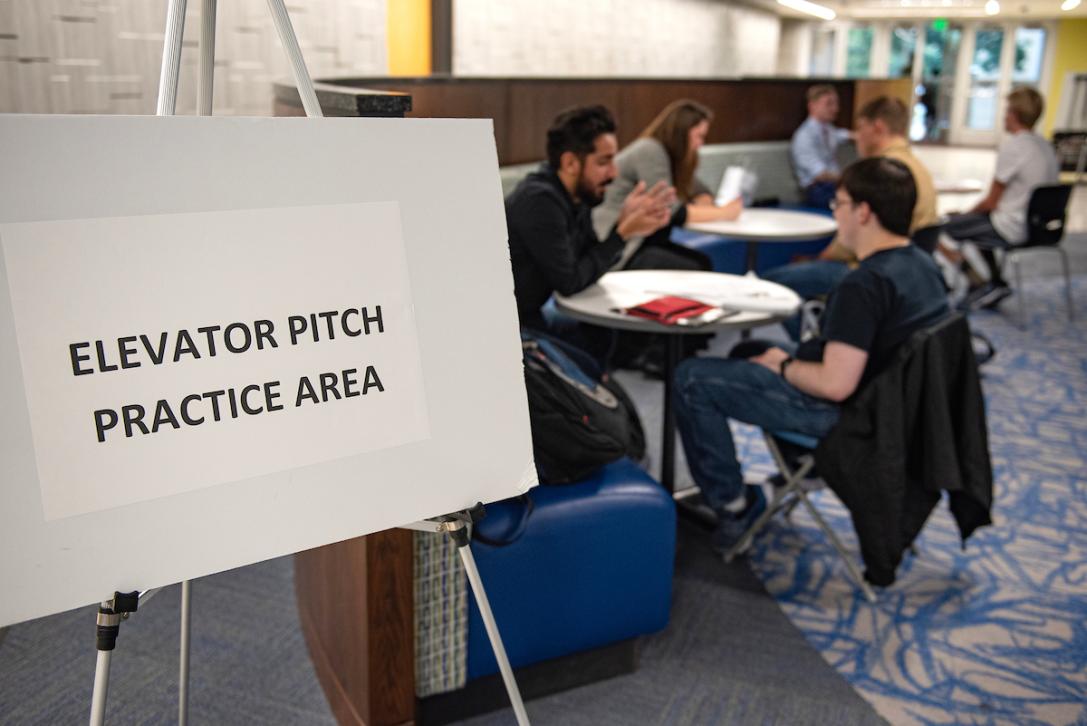
faculty and staff
Career Development Center
Our students rely on us to help them.
At Purdue Fort Wayne, we are committed to supporting students on their path to earning their degree and, ultimately, entering the professional world. Because of this commitment, it’s important to inform and encourage our students early and often about the opportunities, services, and tools that the Career Development Center can offer them—so they can achieve the future they want.



Hire a Student
The ins and outs of student employment.
Discover the resources we have to help you in the hiring process for student employees.

Career-Based Assignments
Career-Based Assignments
Are you looking to have a career-based assignment for your class? Submit a request using the link below. There are several assignment options: a resume/or cover letter review; Typefocus 7 career exploration, or use BIG Interview where students practice interviewing using a video platform and receive feedback from a Career Counselor. Assignments can also be custom tailored to your needs. Complete this form to request one.
Classroom Presentation Options
Choose a topic for your students.
We’d love to bring our knowledge to your classroom, support your students career goals and build their career-readiness. Choose from a list of topics including Career Exploration/Options, Networking 101, and Résumé and Cover Letter Writing. Be sure to provide us with a time allotment, and we will gladly present to your class!
We tailor our career-exploration presentations to your students’ majors. Your students will learn about the variety of career options for their major and review strategies for a successful job search in their chosen area or industry. These presentations are best suited to classrooms with most of the students having the same major.
This presentation helps students learn more about themselves to help them determine what major—and potential career—best suits them.
Graduate school presentations cover researching schools and programs, determining fit, admissions exams, application procedures and tips, and financial assistance available in graduate school.
Students will learn about the different types of interviews, how to prepare for them, dos and don’ts during the interview, and how to answer various types of questions. Information about illegal questions, what to ask an interviewer, and guidelines for following up will also be covered.
Our job-search presentations give students an overview of critical areas of the job-search process and how to become proactive. This presentation also explains the benefits of using Handshake, our free online job-posting system for students and alumni.
It’s not what you know, it’s who you know. Students will learn the fundamentals of networking—including tips, techniques, and etiquette for effective networking.
In a digital world, the line between personal and professional appearances is blurred. This presentation covers the use of various social-networking tools (Facebook, LinkedIn, X) to create a positive online presence that will impress potential employers.
Our overview presentation exposes students to the variety of services available through our office. We cover where to find pertinent information on our website, our events, initiatives that support students and help them prepare for a career, and other free resources. Every student will receive a Student Career Guide and information on Handshake, drop-in hours, and how to schedule an appointment. This is a great presentation for classrooms with a large proportion of freshmen and sophomores.
This presentation aids students in writing a professional cover letter and shares tips on how to get their résumé noticed by employers. They’ll learn what to include in a résumé and how to highlight their education and work experience.
The National Association of Colleges and Employers outlines several top competencies that employers are looking for when hiring. We can help students understand what those competencies are and help them figure out how to be intentional in developing those competencies with a focused path to career success.
The Academic Internship and Cooperative Education program allows students to gain real-world experience related to their major. Topics will cover how to prepare for, find, and engage in their next internship or co-op opportunity.

Employer Referral Form
Employer Referral Form
When faculty and staff hear from companies interested in recruiting students for job and/or internship opportunities, this form provides an easy way for faculty/staff members to submit contact information to the Career Development Center. Once the form is completed by the faculty/staff member, the Career Development Team will reach out to the company and make a connection with the employer. The opportunity will be shared with the entire student body once the details are in place.
Reference Guidelines
Providing references for students.
Sometimes, students may ask you to provide an academic, employment, or character reference—or all three. To help you provide the best possible written reference review the following guidelines.
- Provide a written reference only if a student has given your name for one.
- Be factual; do not editorialize; avoid vague statements.
- Respond to the specific inquiry about the student or job applicant; direct the response to the particular person who requested the information.
- If a “to whom it may concern” reference letter is requested, document that this is the type of reference requested and that the student or job applicant takes responsibility for disseminating the letter to the proper persons.
- Relate references to the specific position for which the person applied and the work that the applicant will perform.
- Avoid giving personal opinions or feelings; if subjective statements or opinions are requested, clearly identify them as opinions and not as facts, and explain how you came to that opinion.
- Be able to document all information that you release.
- State in the reference letter, “This information is confidential, should be treated as such, and is provided at the request of [name of student or applicant], who has asked me to serve as a reference.” Statements such as this give justification for the communication and leave no doubt that the information was not given to hurt a person’s reputation.
- Do not include information that might indicate the individual’s race, ethnicity, religion, national origin, age, disability, citizenship status, sex, gender, or marital status.
- Do not disclose information regarding a student’s education record without the written consent of the student.
- Avoid informal lunch discussions or off-the-record telephone conversations with prospective employers regarding a student’s performance unless the student is aware of and has approved such discussions.
- Information given should be factual, based upon personal knowledge or observation of the student through direct contact with the student.
- If any employer contacts you and advises that a student has given permission for you to give a verbal reference, verify this with the student before giving any information to the employer; verification can include a copy of the student’s signed employment application listing you as a reference or a verbal confirmation by the student, followed by written confirmation.
- Follow the best practices for written references that apply.
- Provide a written reference only if a student has given your name for one.
- Be factual; do not editorialize; avoid vague statements.
- Respond to the specific inquiry about the student or job applicant; direct the response to the particular person who requested the information.
- If a “to whom it may concern” reference letter is requested, document that this is the type of reference requested and that the student or job applicant takes responsibility for disseminating the letter to the proper persons.
- Relate references to the specific position for which the person applied and the work that the applicant will perform.
- Avoid giving personal opinions or feelings; if subjective statements or opinions are requested, clearly identify them as opinions and not as facts, and explain how you came to that opinion.
- Be able to document all information that you release.
- State in the reference letter, “This information is confidential, should be treated as such, and is provided at the request of [name of student or applicant], who has asked me to serve as a reference.” Statements such as this give justification for the communication and leave no doubt that the information was not given to hurt a person’s reputation.
- Do not include information that might indicate the individual’s race, ethnicity, religion, national origin, age, disability, citizenship status, sex, gender, or marital status.
- Do not disclose information regarding a student’s education record without the written consent of the student.
- Avoid informal lunch discussions or off-the-record telephone conversations with prospective employers regarding a student’s performance unless the student is aware of and has approved such discussions.
- Information given should be factual, based upon personal knowledge or observation of the student through direct contact with the student.
- If any employer contacts you and advises that a student has given permission for you to give a verbal reference, verify this with the student before giving any information to the employer; verification can include a copy of the student’s signed employment application listing you as a reference or a verbal confirmation by the student, followed by written confirmation.
- Follow the best practices for written references that apply.